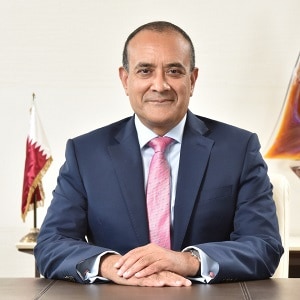Joseph Abraham, group CEO of Commercial Bank of Qatar, talks with Global Finance about how his bank is dealing with the current climate.

Global Finance: How are the bank and the government navigating the current crisis?
Joseph Abraham: The Qatari government came up with very strong measures to support the economy, including a $20.5 billion support package. Commercial Bank is very active in supporting clients through several government programs. Like other banks, we deferred principal and interest payments on loans up to six months, at reduced interest rates. To ensure customer safety, we put a big focus on digital tools that keep the need for human interaction down. With mobile banking, ATM deposit machines and other technologies, we were able to make transaction banking safer, easier and more efficient for our customers.
GF: What are some of the biggest challenges ahead?
Abraham: Airlines, hospitality services, restaurants and retail businesses are heavily affected. People employed in these sectors are also heavily affected, with some facing salary reductions or even losing their jobs. We are monitoring this and offering assistance to customers facing these situations.
GF: What are some of the lessons learned from this crisis?
Abraham: The crisis has pushed our ability to work very nimbly and collaboratively across teams. All had to work together to deliver to the client despite the challenges. The crisis also accelerated the adoption of non-face-to-face transactional banking. Customers were forced to use mobile banking, do remittances online and use cash-deposit machines; and once they tried it, they found it was actually quite simple and intuitive. We have experienced a rapid change in customer behavior, and this presents a big opportunity.
I also see change in relationship management. As customers do more and more of their transactions online, their interaction with the bank becomes more advisory—things like risk outlook or wealth management. Effective advisory needs face-to-face interaction with the client; but with Covid-19, a lot of people have adopted virtual-meeting technologies. I believe this will become a permanent part of existing relationships, but it will also extend our relationship-management capabilities to a wider base of clients—that’s better for the client and the bank.
GF: What new technologies are you betting on?
Abraham: We want to ensure that customers can do all of their transactions via mobile, so APIs [application programming interfaces] and open architecture are very important. But it’s not just a front-end matter, because in order to be really effective, the operational processes also have to be automated. That’s why we are putting a lot of emphasis on robotic process automation. It improves client experience, risk profile and customer-data analytics. We are also looking closely at artificial intelligence, because the more transactions you do online, the more you generate data. This data gives us patterns of information which are very important from a KYC-AML [know your customer–anti-money laundering] perspective.
Due to the growing trend of organizing virtual meetings, we need to have a basis of authenticated interaction. Historically we used signatures, but today we can use biometrics. Commercial Bank is going to implement voice biometrics—we can identify a caller according to voice pattern. Similarly, a face could be authenticated during a virtual meeting.
GF: How do you balance compliance and innovation?
Abraham: I don’t think they are mutually exclusive; they actually go hand in hand. Checking things manually is very inefficient and ineffective. New technologies allow us to take data, analyze it, identify patterns and make better informed decisions, so compliance improves with technology.
GF: Where else do you see growth potential?
Abraham: I believe that people are now looking at their whole pattern of investment in a more diversified manner. In the GCC, there was a predilection towards real estate as the core investment concentration, yet prices across the region and globally have gone down. I think that while people will still have an interest in real estate, they will also look more into equity, bonds and even insurance. That will create growth opportunities in advisory and wealth management.



